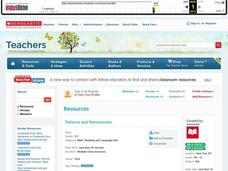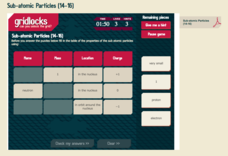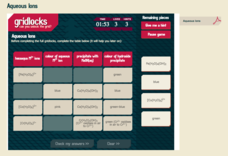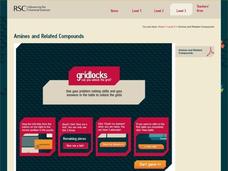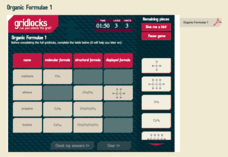Curated OER
Illinois: Crossword Puzzle
In this United States history worksheet, students use the 15 clues in order to fill in the crossword puzzle with the appropriate answers pertaining to Illinois.
Curated OER
Twelve Wackie Word Problem Puzzles
In this word problem worksheet, learners solve twelve word puzzle problems. Solutions are provided.
Curated OER
Twenty-Four Familiar Saying Word Puzzles
For this word puzzle worksheet, students translate a familiar saying from the initial letter for twenty-four problems. An example is provided ta the top of the page and the solutions are available by clicking on the tab on the bottom of...
Curated OER
New Testament Puzzle
For this New Testament puzzle worksheet, students read clues and determine the book of the Bible for each clue listed. They write the letters for the book in a matrix. This two-page worksheet contains 20 problems. A link for the...
Curated OER
Patterns and Pentominoes
Students solve pentomino puzzles. For this problem solving lesson, students discuss how pentomino puzzles play into the plot of Chasing Vermeer by Blue Balliett and practice solving a pentomino puzzle on their own. Students will...
Curated OER
Putting It All Together
Young scholars examine a painting. In this shapes and puzzle lesson, students view Guston's painting Blue Water and identify the colors, shapes and recognizable forms. Young scholars work in groups to put together puzzle pieces of the...
Royal Society of Chemistry
Alcohols (14-16)
Ethanol, a grain alcohol, reduces emissions and conserves petroleum when mixed into gasoline. Four puzzles challenge pupils to match alcohols to their structural formulas, types of alcohol, and full oxidation products. Each puzzle...
Royal Society of Chemistry
Organic Names—Functional Groups
Worried that your lesson plan about functional groups is dysfunctional? Liven things up with interactive puzzles! Curious chemists arrange functional groups based on name, formula, suffix, and an example. The challenge begins when the...
Curated OER
Telling Time With Fuses
In this telling time worksheet, students use fuses which burn at different times to tell times in 45 minute increments. They solve this number puzzle and check their answer with an online solution.
Royal Society of Chemistry
Sub-Atomic Particles (14-16)
In 1897, J.J. Thomson discovered the electron, the first subatomic particle proven to exist. Scholars review their understanding of electrons, protons, and neutrons as they work through the puzzles. Each puzzle connects two or three...
Royal Society of Chemistry
Aqueous Ions
Lose an electron? You should keep an ion it! Scholars test their knowledge of aqueous ions while completing four puzzles. Each puzzle requires knowledge of the ion, the color of the ion, the precipitate, and the color of the precipitate.
Royal Society of Chemistry
Amines and Related Compounds
Scientists call a molecule that contains a nitrogen atom that behaves as a base an amine. Four puzzles, related to amines and similar compounds, challenge scholars to prove their knowledge. After passing each puzzle, the next increases...
Royal Society of Chemistry
Alloys
What are alloys, and why do we use them? Through a series of interactive puzzles, scholars examine the components and uses of several common alloys. The accompanying teacher's resources provide support in using the lesson, printable...
Royal Society of Chemistry
Periodic Table 2
While the periodic table looks complex, it is really arranged by only two variables, atomic number and electron configuration. The set of four puzzles focuses on groups 3, 4, 5, and 6 or 13, 14, 15, and 16, depending on your periodic...
Royal Society of Chemistry
Elements 2
Did you hear about the chemist reading the book about helium? He couldn't put it down. Scholars match 12 chemical elements, including helium, to their symbols. Then they complete three Sudoku-style puzzles using these names and symbols...
Royal Society of Chemistry
Naming Esters
Do your chemistry scholars know their esters? Introduce the class to the nomenclature and structural formulas of common esters through thought-provoking games. Individuals or pairs of pupils match the name with the formula before using...
Royal Society of Chemistry
Hydroxide Precipitates
When two liquids combine and a solid forms, the new substance is called a precipitate. Scholars test their knowledge of hydroxide precipitates and their properties. A series of four increasingly difficult puzzles challenge their logic...
Royal Society of Chemistry
Esters from Alcohols and Acids
Fats and oils often contain esters, which sometimes find their way into perfumes due to their pleasant smells. Scholars match the name of esters made from four different types of alcohol and four different types of carboxylic acids....
Royal Society of Chemistry
Electronegativity Values
Finally, an electronegativity resource your class will be strangely drawn to! Skilled scientists manipulate interactive puzzles to gain an understanding of common electronegativity values. The great thing? You can conduct the lesson...
Royal Society of Chemistry
Organic Formulae 1
Puzzles are the formula for success in organic chemistry! Hydrocarbons abound in the first of two interactives involving basic organic molecules. The easy-to-use lesson is available online and in print form, so you can pick your delivery...
Royal Society of Chemistry
pH and pOH
Feeling a little neutral about your pH and pOH teaching strategy? Perk it up with engaging puzzles! Young scientists relate ion concentration to pH and pOH, as well as the dissociation constant for water. The resource is available as an...
Royal Society of Chemistry
pH 4: Activity
Sometimes playing games in class isn't a bad thing. Science sleuths evaluate and calculate pH and pOH with an online resource. They then manipulate concentration information and relate it during a series of puzzles.
Royal Society of Chemistry
Significant Figures
Ready to add some innovation to your significant figures lesson? Pupils practice sig fig rules using a puzzle approach. Check out the Teacher's Area for printable materials, an answer key, and strategies for implementing the resource.
Royal Society of Chemistry
Some A-level Reagents
Learning names and formulas can be a daunting task for young chemists, so support their study with interactive puzzles! First, users match each formula with its correct name. Then, individuals use them to complete three logic games.
Other popular searches
- Math Puzzles
- Deductive Reasoning Puzzles
- Crossword Puzzles
- Science Crossword Puzzles
- Logic Puzzles
- Tangram Puzzles
- Math Crossword Puzzle
- Paper Folding Math Puzzles
- Pangaea Puzzle
- Thanksgiving Math Puzzles
- Rebus Puzzles
- Halloween Math Puzzles






